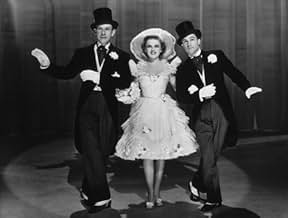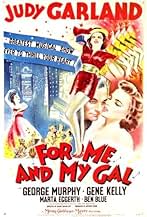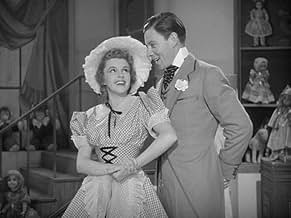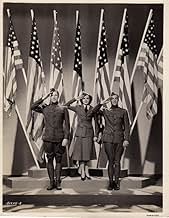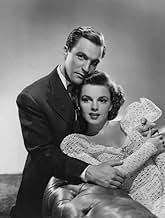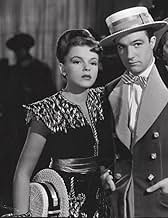AVALIAÇÃO DA IMDb
7,0/10
4 mil
SUA AVALIAÇÃO
Adicionar um enredo no seu idiomaTwo vaudeville performers fall in love, but find their relationship tested by the arrival of WWI.Two vaudeville performers fall in love, but find their relationship tested by the arrival of WWI.Two vaudeville performers fall in love, but find their relationship tested by the arrival of WWI.
- Direção
- Roteiristas
- Artistas
- Indicado a 1 Oscar
- 4 vitórias e 1 indicação no total
Mártha Eggerth
- Eve Minard
- (as Marta Eggerth)
Stephen McNally
- Mr. Waring
- (as Horace McNally)
Ernie Alexander
- Theater Workman with Big Die
- (não creditado)
Hooper Atchley
- Assistant Stage Manager
- (não creditado)
Walter Baldwin
- Bill
- (não creditado)
Gurney Bell
- Member - Sportsmen Quartet
- (não creditado)
John Breen
- Soldier
- (não creditado)
Ken Darby
- Member - The King's Men
- (não creditado)
George Davis
- France Taxi Driver
- (não creditado)
Bill Days
- Member - Sportsmen Quartet
- (não creditado)
John Dilson
- Lou
- (não creditado)
Jon Dodson
- Member - The King's Men
- (não creditado)
Lester Dorr
- Stage Manager
- (não creditado)
Ruth Dwyer
- Nurse
- (não creditado)
Avaliações em destaque
Though a thinly veiled piece of propaganda for WWII sentiment, it did the trick. I couldn't believe I cried not once but three times at this Kelly/Garland musical. An amusement park of a flick. With rollercoaster rides of joy, mood swings of sadness and insecurities, all rolled into a sappy feel good post-depression fluff. Who needs hormones when you can watch this. Great star vehicle for Kelly,it catapulted him into the rarified air of those who have talent, good looks, and that certain "something". Though at times he seems a bit in awe of his surroundings, it comes off as cockiness and works. Garland's sense of innocent security grounded this film and proved she was already in the stratosphere. The supporting cast held up their ends admirably. Enough to make this film enjoyable even in these jaded times.
'For Me and My Gal' had so much going for it on paper, with the involvement of immensely talented people like Judy Garland, Gene Kelly and Busby Berkeley. It has its flaws, but when it's good it's fabulous and showcases the two stars brilliantly.
The story and script are admittedly slight and heavy in the clichés, complete with an ending that feels tacked on (and apparently it was, hardly surprising). The supporting cast's performances also don't compare to those of Kelly and Garland. Well George Murphy is good, he is very likable and charming, the problem is that he is underused and deserved more considering his talent. Ben Blue is unfunny and annoying however, and Marta Eggerth seemed out of place, am a fan of the operatic style of singing but there are far more beautiful voices than Eggerth's rather shrill and metallic sound and the singing doesn't really fit the style of the songs.
However, it is very difficult to be too hard on 'For Me and My Gal' because it fills me with so much joy and really does tug at the heart. The best thing about the film is Garland, who is absolutely sensational, with remarkably graceful dancing and as ever her voice is one you can listen to for hours and not get enough of. Her role here is also one of her most relatable and radiantly likable ones. Kelly may have had more endearing roles in his career, but he really shines in charm and technical skill in his debut where his material plays marvellously to his strengths. The two of them are simply magical together, and one is entranced every time they're on screen together or individually.
It is also a visually beautiful film. Technicolor it ain't, but it is not a film that cries out for it. The lavishness and elegant sumptuousness is still there and it is beautifully filmed. The songs are truly lovely, with the title song and "When You Wore a Tulip" standing out, and advantaged even further by top-notch direction and choreography by Berkeley (throughout, but especially in those two numbers), it may lack the kaleidoscopic style of his earlier films but never looks overblown or static, basically what cinema is all about.
While flawed, the story is still very charming, is lots of fun and there are also some genuinely touching parts that tug at the heart-strings. The pacing never feels dull, even with the slightness, which faces the danger of over-stretching and padding, and over-familiarity.
All in all, not a favourite but for fans of Kelly, Berkeley and especially Garland it is a must regardless of its issues. 8/10 Bethany Cox
The story and script are admittedly slight and heavy in the clichés, complete with an ending that feels tacked on (and apparently it was, hardly surprising). The supporting cast's performances also don't compare to those of Kelly and Garland. Well George Murphy is good, he is very likable and charming, the problem is that he is underused and deserved more considering his talent. Ben Blue is unfunny and annoying however, and Marta Eggerth seemed out of place, am a fan of the operatic style of singing but there are far more beautiful voices than Eggerth's rather shrill and metallic sound and the singing doesn't really fit the style of the songs.
However, it is very difficult to be too hard on 'For Me and My Gal' because it fills me with so much joy and really does tug at the heart. The best thing about the film is Garland, who is absolutely sensational, with remarkably graceful dancing and as ever her voice is one you can listen to for hours and not get enough of. Her role here is also one of her most relatable and radiantly likable ones. Kelly may have had more endearing roles in his career, but he really shines in charm and technical skill in his debut where his material plays marvellously to his strengths. The two of them are simply magical together, and one is entranced every time they're on screen together or individually.
It is also a visually beautiful film. Technicolor it ain't, but it is not a film that cries out for it. The lavishness and elegant sumptuousness is still there and it is beautifully filmed. The songs are truly lovely, with the title song and "When You Wore a Tulip" standing out, and advantaged even further by top-notch direction and choreography by Berkeley (throughout, but especially in those two numbers), it may lack the kaleidoscopic style of his earlier films but never looks overblown or static, basically what cinema is all about.
While flawed, the story is still very charming, is lots of fun and there are also some genuinely touching parts that tug at the heart-strings. The pacing never feels dull, even with the slightness, which faces the danger of over-stretching and padding, and over-familiarity.
All in all, not a favourite but for fans of Kelly, Berkeley and especially Garland it is a must regardless of its issues. 8/10 Bethany Cox
How both stars must have rolled their eyes when they read this screenplay. The volume of clichés is atrocious: The oversentimental celebration of vaudeville; the romantic triangle; the heel gaining a conscience; the splitting-up-the-act intrigue; the brother and his fate; lines like "you'll never be ready for the big time, because you're small-time in your heart" (Judy nevertheless makes it work). Yet it's a pleasure to view, because Judy and Gene really bring out something special in each other. They did again in "Summer Stock"; in "The Pirate," to my eyes, not so much. She has a gravity and sincerity that balance his self-adoration and schtick, and he was always more persuasive playing a guy of questionable moral values than a mensch. You have to put up with George Murphy at his dullest and Ben Blue at his unfunniest, and Marta Eggerth, as accomplished as she is, appears to be in the wrong movie--she should be doing a Joe Pasternak operetta, not an Arthur Freed extravaganza. But when the two leads sing or dance (she was, in the Forties, a better dancer than she was ever given credit for) or, surprisingly, act together, they're tremendously moving. At her best, which she wasn't always but is here, Judy was the best there was. My favorite moment: the ending of "After You've Gone." Rather than smothering her performance in applause and cutting to a shot of an appreciative audience, Berkeley just fades out. It's MGM's way of saying: Enjoy it, folks, this is as good as it gets.
In 1943 Gene Kelly made "For Me And My Gal". It was a film starring that rising star of MGM Judy Garland, set in the years from 1915 - 1919. Garland wanted Kelly to appear in this film as her lover, Harry Palmer. It was an unusual film debut for Kelly, now recalled for his masterful dancing in musicals like "Singing In The Rain" and "An American In Paris". Instead, although it was a musical (using many tunes of the Tin Pan Alley period, it really was a character study. It looked at Kelly's opportunistic anti-hero, who does love Garland, but who is career centered to the point that he injures himself (he thinks it will be a slight injury) to avoid the draft.
It is a passably good film, due to the chemistry of the leads and such supporting film actors as Keenan Wynn (as Kelly's long suffering agent, who gets to tell him off), and George Murphy (as the would-be lover of Garland, who can't get her attention away from the unworthy Kelly).
The interest I have in the film is why Garland chose Kelly for this part. She apparently insisted that he be used for this film. The reason is that his biggest Broadway success was the 1941 show "Pal Joey", where he played the first anti-hero in Broadway history. Joey is a user of women, who wants to own a fancy nightclub in Chicago. He never rises above the sleazy dive he acts as M.C. at. He could be Harry Palmer's distant, slightly cousin. Garland would have seen Kelly play a role of a heel where he sang a golden flow of Rogers and Hart melodies, and do some good hoofing as well. It was the perfect "screen test" for Kelly to use to prove his ability to play Palmer. So he got his first role, and then went on to the major achievements of his career.
It is a passably good film, due to the chemistry of the leads and such supporting film actors as Keenan Wynn (as Kelly's long suffering agent, who gets to tell him off), and George Murphy (as the would-be lover of Garland, who can't get her attention away from the unworthy Kelly).
The interest I have in the film is why Garland chose Kelly for this part. She apparently insisted that he be used for this film. The reason is that his biggest Broadway success was the 1941 show "Pal Joey", where he played the first anti-hero in Broadway history. Joey is a user of women, who wants to own a fancy nightclub in Chicago. He never rises above the sleazy dive he acts as M.C. at. He could be Harry Palmer's distant, slightly cousin. Garland would have seen Kelly play a role of a heel where he sang a golden flow of Rogers and Hart melodies, and do some good hoofing as well. It was the perfect "screen test" for Kelly to use to prove his ability to play Palmer. So he got his first role, and then went on to the major achievements of his career.
If this movie was simply Gene Kelly and Judy Garland exchanging quips (the "Hello Springtime!" bit is especially good) and singing and dancing in a coffee shop, then it would still be entertaining. But that's really not all it is. This movie is more like a drama/romance than a musical, in the way that there are some songs, very good ones, but there is more story than numbers. Yes, the idea is an old one, but there are a few twists that distinguish it from any other wartime romance. (Don't go expecting The Maltese Falcon though.) The little plot weaknesses are forgotten as the actors (particularly Garland) hold it all together. I cried twice, and I almost never cry at movies. I fully recommend For Me and My Gal, unless you're dead-set on a tear-free day.
Você sabia?
- CuriosidadesGene Kelly's film debut. It is known that Judy Garland got him the job after seeing him in the Broadway musical "Pal Joey". Kelly made films in a variety of genres over the next few years but became best known for his energetic dancing style in MGM hits such as Marujos do Amor (1945), Um Dia em Nova York (1949), and Sinfonia de Paris (1951). Kelly, who was a choreographer and director as well as a dancer and singer, received a special Academy Award in 1951 in recognition of his outstanding achievement as an actor, dancer, singer and director. He also received a Life Achievement Award from the American Film Institute in 1985. The song "For Me and My Gal" became one of Kelly's signature songs.
- Erros de gravaçãoJo's YWCA uniform (like much of her clothing in the latter half of the film) is characteristic of World War II, when the film was released, and not World War I, in which it is set. Her uniform's shoulders are too broad and the skirt too short, and she is wearing sheer stockings and pumps instead of opaque stockings and high boots or oxfords.
- Citações
Harry Palmer: Why didn't you tell me I was in love with you?
- Cenas durante ou pós-créditosA picture of an infantry soldier in New York harbor and the text "America needs your money. Buy war bonds and stamps at this theatre."
- Versões alternativasThere is a 1993 colorized version of the film that aired on TNT
- ConexõesEdited into American Masters: Gene Kelly: Anatomy of a Dancer (2002)
- Trilhas sonorasFor Me and My Gal
(1917) (uncredited)
Music by George W. Meyer
Lyrics by Edgar Leslie and E. Ray Goetz
Played during the opening credits and often as background music
Played on piano (with background orchestra) by Judy Garland (uncredited) and sung and danced by her and Gene Kelly (uncredited)in a coffee shop
Reprised by Judy Garland (uncredited), Gene Kelly (uncredited) and chorus at the end
Principais escolhas
Faça login para avaliar e ver a lista de recomendações personalizadas
- How long is For Me and My Gal?Fornecido pela Alexa
Detalhes
- Data de lançamento
- País de origem
- Idiomas
- Também conhecido como
- For Me and My Gal
- Locações de filme
- Empresa de produção
- Consulte mais créditos da empresa na IMDbPro
Bilheteria
- Orçamento
- US$ 802.000 (estimativa)
- Tempo de duração1 hora 44 minutos
- Cor
- Proporção
- 1.37 : 1
Contribua para esta página
Sugerir uma alteração ou adicionar conteúdo ausente

Principal brecha
By what name was Idílio em Do-Re-Mi (1942) officially released in India in English?
Responda


